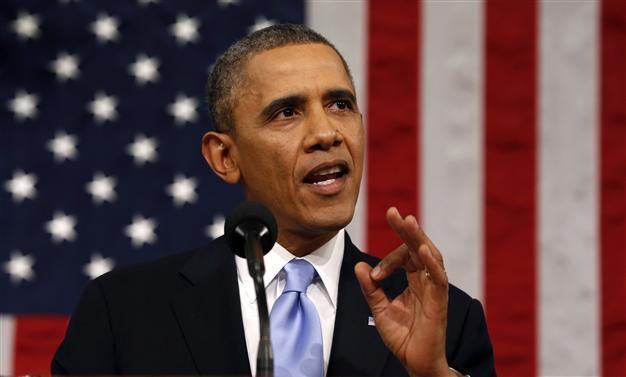Obama challenges Congress on inequality, lays out go-it-alone approach
WASHINGTON - Reuters

US President Barack Obama delivers the State of Union address before a joint session of Congress in the House chamber, Jan. 28. AP photo
U.S. President Barack Obama vowed to reverse a tide of economic inequality Jan. 29, seeking to outflank rival Republicans and revive his stumbling second term.In his annual State of the Union address, Obama vowed to use his executive powers to lift up workers, improve education and clean the environment if his foes in Congress balk at more sweeping action.
"America does not stand still - and neither will I," Obama said, talking, past the lawmakers gathered to listen in the House of Representatives directly to millions of television viewers.
"Inequality has deepened. Upward mobility has stalled and too many still aren't working at all," Obama said in an address to lawmakers, cabinet members, Supreme Court justices and top military brass, punctuated by ritual standing ovations.
While focusing squarely on a domestic audience, Obama strayed into foreign policy only briefly.
He vowed to support free expression in Ukraine, warned al-Qaeda's threat had evolved and yet again urged Congress not to thwart his efforts to close the war on terror camp at Guantanamo Bay, Cuba.
But mostly Obama mined a political seam that has proven rich in the past, billing himself as the champion of middle class families fighting to overcome the worst recession since the Great Depression.
He opened on a note of optimism, saying that thanks to "five years of grit" by the American people, the US economy was finally poised for a "breakthrough." "The United States is better positioned for the 21st century than any other nation on earth," Obama declared, touting the lowest unemployment rate in five years and a rebounding housing market.
Yet he argued the "defining project of our generation is to restore" the promise of equality of opportunity for all Americans.
He promised to wield his power to raise the minimum wage for federal workers on new contracts from $7.25 to $10.10 per hour, and to create a new retirement savings "starter" scheme to help millions of Americans.
Obama called on corporate CEOs to pledge not to discriminate against long-term unemployed job seekers, and to introduce new energy efficient fuel standards for trucks while working with cities and states to promote cleaner power.
But Obama's vows of action are likely to reach far fewer Americans than could be accomplished through legislation. For example, while he has the power to wage the minimum wage for federal workers, a reluctant Congress would be required to extend the measure across the entire economy.
He called on lawmakers to do just that but they appear unlikely to heed his call. Such is the stranglehold clamped by Republicans on Congress, much of Obama's second term agenda is stillborn.
While Obama's headline was easing the burden of the middle class, the subtext was reviving a presidency that seems to be racing towards early lame duck status after a disastrous 2013.
Veto threat on new Iran sanctions bill
On foreign policy, Obama also warned that "the fact is, that danger remains" and the United States had "to remain vigilant" in face of changing global threats. "While we have put al-Qaeda's core leadership on a path to defeat, the threat has evolved, as Al-Qaeda affiliates and other extremists take root in different parts of the world," Obama told U.S. lawmakers.
"But I strongly believe our leadership and our security cannot depend on our military alone," he said.
"As commander-in-chief, I have used force when needed to protect the American people, and I will never hesitate to do so as long as I hold this office," he warned. "But I will not send our troops into harm's way unless it's truly necessary." In November, Tehran struck an interim deal struck with six global powers, under which Iranian leaders agreed to scale back their uranium enrichment in return for sanctions relief.
"It is American diplomacy, backed by pressure, that has halted the progress of Iran's nuclear program - and rolled parts of that program back - for the very first time in a decade," Obama said.
Thanks to the six-month accord, the Islamic republic has begun eliminating its stockpiles of enriched uranium, has agreed to daily inspections and is not installing advanced centrifuges, he said.
"With our allies and partners, we're engaged in negotiations to see if we can peacefully achieve a goal we all share: preventing Iran from obtaining a nuclear weapon," he stressed.
But he warned that negotiations for a comprehensive deal, due to start in New York next month,"will be difficult. They may not succeed." Answering criticism from some lawmakers about negotiating with Iran, Obama said the U.S. was "clear-eyed" and any deal would not be based merely on trust but on verifiable actions.
"The sanctions that we put in place helped make this opportunity possible. But let me be clear: if this Congress sends me a new sanctions bill now that threatens to derail these talks, I will veto it. "For the sake of our national security, we must give diplomacy a chance to succeed," Obama said.
















